one
LeTV TV LCD screen is not with us at a quality level
Flicker is often there, flicker is upside down, it makes people laugh and laugh. Is Foxconn production line all apple? Sharp and SDP are obviously not the same thing! As for the performance comparison of music TV as issued today, I as a professional practitioner must stand up to respond - LCD screen we do not have a quality level! Consumers must guard against being cheated.
Foxconn produced a lot of brands on a production line, obviously not all apple. Similarly, both Sharp and SDP are produced on a 10th-generation line, and the quality is obviously not the same.
LeTV is right to say that there is only one line of the 10th generation in the world, which is Sharp's. Because of the huge cost of this production line, Sharp chose to sell some of its shares to Foxconn at the time and it would have SDP. However, the SDP production line only produces glass cells and does not produce T-CON. A complete screen is composed of glass Cell+T-CON, and the T-CON is also the core of the screen.
Even if it is the production of glass cells, SDP screens are Foxconn glass cells manufactured according to their own standards using Sharp's production lines, and Sharp Cell is not a concept at all. Many of Sharp's core technologies are not licensed to Foxconn. . This is also the year when the first generation of 60-inch LeTV promotion, illegal use of the Sharp brand to do propaganda, and was the source of the prosecution of Sharp.
Sharp's own standards for product quality and quality of purchased components are much higher than SDP. Not to mention that SDP only offers a glass Cell.
Next, let's talk about the core component of another screen, T-CON.
The role of T-CON is to send the V-By-one digital signal sent from the mainboard to the logic board to control the timing and convert the digital signals needed for driving the LCD glass substrate to drive the LCD screen to display the image. Sharp's T-CON design has a unique screen parameter control Know-how and picture quality control Know-how, and will be updated every year, and these will not be open to SDP.
The T-CON component is the brain of the entire LCD screen. The TV T-CON of Xiaomi TV was designed by Sharp himself and the T-CON of LeTV was designed by SDP. This is like a stone. Someone can make it into a jade. It is worth a lot of money, and someone who has polished a lifetime is still only a stone.
Finally, talk about the poor start-up time. Sharp's 10th generation line panel, which was put into production in 2016, has been updated with a 70-inch T-CON design, while SDP has not updated LeTV's 70-inch screen. In other words, LeTV said that there was no difference between the LCD panel that was put into production at the end of 2014 and the LCD panel that was put into production in 2016. That was really confusing. Both have huge differences in the T-CON design.
Semiconductor Moore's Law tells us that one year does not mean a generation gap?
two
LeTV 70-inch TV video decoding has major flaws
LeTV 70-inch TV video decoding has major flaws, it has 5 kinds of video "can not support": H.265 10bit, 4K 60fps (4K Blu-ray DVD standard), high stream, ISO, more funny is the playing Dolby no sound! Is LeTV still a 4k TV? Millet 70-inch full support, this is true 4K, and 9999 yuan, less than 3,000 as LeTV!
Video playback: LeTV 70-inch TV 5 "can not support", millet all-around!
1, LeTV does not support H.265 10bit
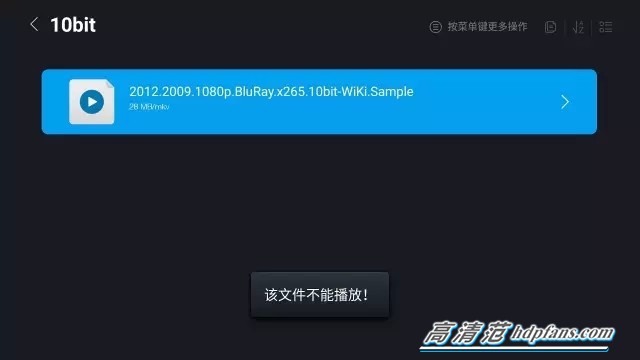
Millet supports H.265 10bit

Explain what H.265 10bit is. When the video file is compressed, the color space has two kinds of 8bit and 10bit, 4K Blu-ray DVD player recommended 10bit standard, able to more accurately restore the true color. The 70-inch big TV is 4K again. This high-end product does not support H.265 10bit, which is a pity.
Why does LeTV not support it?
Because: LeTV uses Qualcomm Snapdragon 810 processor, to a certain extent, this is a mobile phone chip, the screen quality of mobile phones is not too high, for cost considerations, does not support H.265 10bit, Xiaomi used The TV flagship chip MStar6A928 has extremely high requirements for picture quality and fully supports H.265 10 bit decoding.
2, LeTV does not support H.265 4K 60fps

Millet supports H.265 4K 60fps

H.265 4K 60fps is a video encoding format. The new true 4K Blu-ray standard specification stipulates that Blu-ray movies must be suppressed in H.265/HEVC high-efficiency video coding format with a resolution of 3840 x 2160 and a frame rate of 60 frames per second (FPS). This is true 4K. The quality of the picture.
Currently, Panasonic, Samsung, and Sony have all released players that support the standard. The major movie companies have also stated one after another that 4K Blu-ray DVD movies are ready. 20th Century Fox has stated that it will release more than 30 4K Blu-ray DVD movies this year, including the latest "Mars Rescue."
With 4K Blu-ray discs and 4K Blu-ray DVD players, for those who want to build home theaters, the next thing to do is to buy a TV that supports true 4K Blu-ray playback, that is, to play H. 265 4K 60fps format video. However, LeTV introduced 4K 70-inch TV, and it cannot!
Does not support H.265 10bit, does not support H.265 4K 60fps too, and these two are the standard output of HDMI2.0, only support HDMI1.4 music as 70 inches TV or 4K TV? This is a major defect!
Why is this so?
The problem is still that the Qualcomm Snapdragon 810 processor used by LeTV as a 70-inch TV cannot compete with the MStar6A928, the TV flagship chip used in the 70-inch TV.
3, LeTV does not support high stream
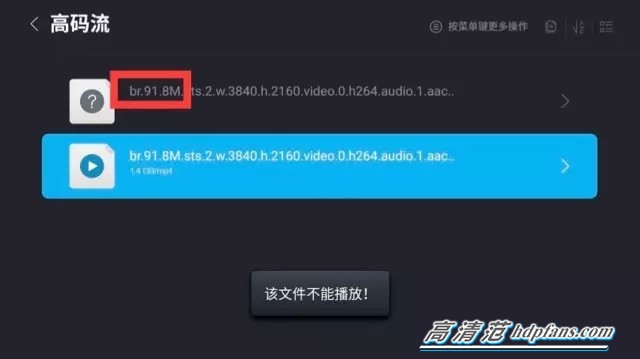
Millet supports high stream

This is a 91.8 Mbit high stream video. The high bit rate is how much data is transmitted per second. The higher the picture quality is, the better the picture quality is. The high bit rate means high picture quality.
Why doesn't LeTV 70 inch support?
This still depends on the chip. The Qualcomm Snapdragon 810 processor used by LeTV 70-inch TVs only supports 20 Mbit, and the TV flagship chip MStar 6A928 used by the 70-inch TV can play 100 Mbit smoothly. Qualcomm APQ8094 processor as a mobile phone chip, it is really top-notch, but who will see so high-end video on the phone? Therefore, the demand for quality is certainly not so high. The main thing of the TV chip is the decoding capability. Different demands are different, but we can't blame music.
4. LeTV does not support ISO
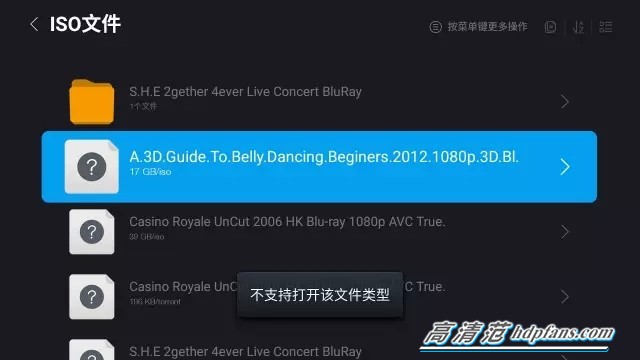
Millet supports ISO

ISO is a video format that fans download from the Internet. There is really not much support for this TV and we cannot blame it. However, Xiaomi TV pays more attention to enthusiasts' experience and has developed this function.
5, music video playback Dolby no sound, can not be decoded. Whether it's local play or online play, this is very silent, because Blu-ray high-definition programs are mostly Dolby-encoded, losing this function, directly back to the silent era of the 1930s, the most funny Yes, LeTV has a Dolby area. Broadcasting its own area is also a silent movie. It is really drunk.
In addition, it also needs to be emphasized that in addition to these, Xiaomi TV also supports:
Xiaomi does not use Internet TV as a gimmick to design products. Internet TV must first be a fine TV with quality and decoding capabilities. The immersive and astounding audiovisual experience is the most important design element. This is also ours and others. The most important segment of internet brand television.
three
Without independent research and development, LeTV does not understand and understand acoustically
LeTV’s ability to independently develop its own TV products is not yet a conclusion for the time being. But to be sure, LeTV is still a layman on the sound.
LeTV developed the article last week, saying that the self-developed audio of Xiaomi TV is not as good as the LeTV audio developed by Harman Kardon, and it also shows a personal photo of our teacher Wang Fuyu. In this regard, teacher Wang Fuyu, director of the acoustic architecture of Xiaomi TV, asked me to address him on four points:
1. The ability to independently develop high-quality audio that satisfies users is the value of Xiaomi TV. Why should we spend huge sums of money on other people's wedding dresses and then transfer the cost to users? Finding foreign brands OEM OEM can not do cost-effective!
2. The audio industry knows that making sounds is as difficult as possible. Between the so-called square inch can hear the stormy sea waves square hero character. Millet's subwoofer (ɸ194mm, 320mm high) is at least one-third smaller than LeTV (ɸ226mm, 400mm high), and the Soundbar's height (55mm) is only half that of LeTV (87mm). The reason is to match the TV height of the user. , I do not want the Soundbar too high to block the TV screen. LeSound's Soundbar design obviously did not consider the height of the TV equipped with user-provided.
3. The choice of a subwoofer for the Millet TV 3 as an option gives the user more choice, based on extensive market research and considerations from the user's point of view. Because many domestic urban dwellers are densely populated, overweight bass may affect neighbors, and generally do not dare to open the subwoofer or adjust the volume to a low level. Plus, some users do not like very low-frequency sounds. For this purpose, we specifically upgrade the new generation of Soundbar to take into account the necessary bass effects. It can satisfy most sound effects and music playback requirements without the use of a subwoofer, so that users do not have to pay for undesired heavy bass. And LeTV is a must-have accessory because without the subwoofer, the effects of a separate Soundbar cannot be achieved at all. .
The following figure shows the low frequency contrast curve of the soundbar alone (below 100Hz, the difference is above 10dB).
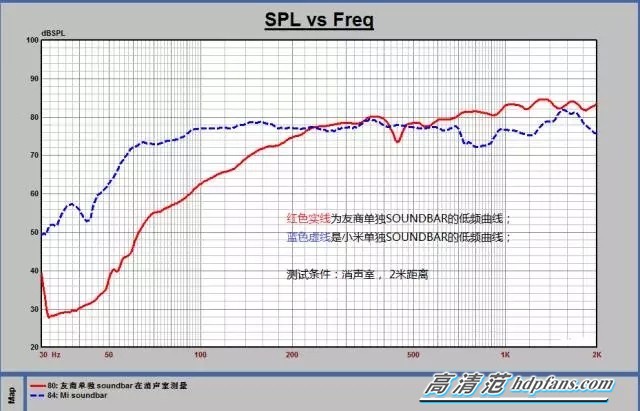
4. With respect to the speaker unit orientation, well-known consumer electronics audio companies such as BOSE LIFESTYLE135 and SONOS' Playbar have also adopted a similar design.

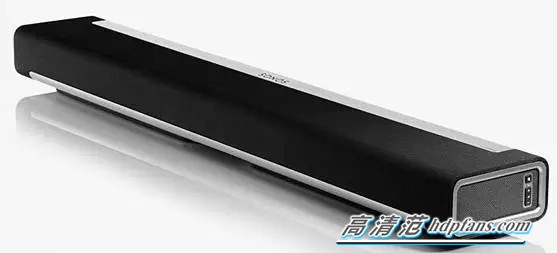
The so-called sound image (or stereo image) is only related to the sound pressure difference and the time difference between the left and right sound channels reaching the ears, and the human ear cannot distinguish the direction of the sounding speaker at all. On the contrary, the loud speaker placed upwards increases the reflection sound, giving the listener a broader sound stage and better musical immersion. Only know the benefits of direct sound I do not know the beauty of the reflected sound and reverb sound can only say LeTV is a little knowledge.
Forget it, LeTV's little understanding of television products, but also beyond the sound. Non-genuine Sharp screen, pseudo 4K decoding capability, LeTV performance is not professional.
As a hardware product, it is not the voice of a person who shouts loudly. Whoever is better able to speculate on stock prices depends on who is the product of "hard." This is the reason why millet TV has been grinding products for three years and the market has invested zero. On the basis of doing a good job of hardware products, talk about other things, and the cost-effectiveness is a bit more polished than it was advertised by PPT. This is the true spirit of the Internet. The funny thing is that, obviously, there is no price-performance ratio, but a very high price is set, and you should also label yourself with a label lower than the price of Bom. Hey, what is the user?
Millet TV 3 true 4K 70 inch next generation split TV, using genuine Sharp original imported 10th generation line screen, can decode true 4K 60fps video (not by LeTV's 30fps), and comes standard with independent research and development of split audio equipment, and The price is 3,000 cheaper than LeTV, which is said to have a lower price than Bom. This is the real value for money!
What needs to be emphasized is that unlike LeTV's own content alone, Xiaomi TV adopts an open platform to do content operations. Its content is richer than LeTV. In 2015, there were 81 movies with a total volume of over 73 million in Mainland China. Ministry of Landing TV.
Finally, please support the independent research and development products belonging to the Chinese people.
four
All the millet that LeTV cannot do can do
Now that Internet TV and smart TVs are prevalent, we still watch television programs. Otherwise, TVs can only be called "multimedia terminals."
How can a television receive television programs? First, it needs a high-frequency head. With this component, first, the TV can receive digital terrestrial signals. Second, it can also receive analog TV signals. Analog TVs can be watched on the TV.
LeTV has a high-frequency head on the 4 to 70 inches, but it is made into a separate gadget that is not on the TV's motherboard. This gadget can be connected to a TV host via a USB interface and will occupy a USB interface for a long time. This is only secondary, and the most important thing is that, when using this high-frequency head accessory to directly connect the cable TV analog signal, it cannot be played.
In other words, LeTV can receive terrestrial digital signals, but it cannot directly connect cable TV and broadcast television programs.
We might say that people who can afford 70-inch TVs do not have a set-top box? This group of people does not need high-frequency head input capability at all. And in those places where there are no set-top boxes in remote areas, who would spend 10,000 yuan to buy TV? Therefore, the so-called high-frequency head input capability is not the product core of the 70-inch TV.
LeTV 70-inch TVs cannot accept analog TV signals and are logically understandable from the market. However, things did not stop there. LeTV does not have an AV interface and a VGA interface.
The AV interface is an interface that appears earlier. It consists of red, white, and yellow three-color lines. The yellow line is a video transmission line, and red and white are the sound channels responsible for the left and right channels. As shown below
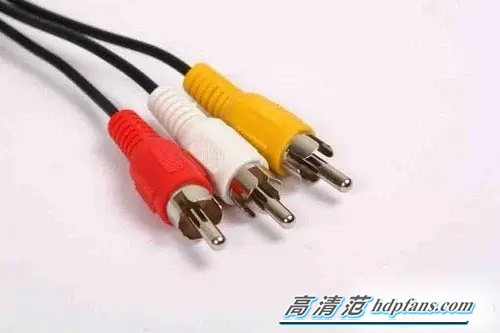
At present, many set-top boxes only support the AV interface, and there are not many high-definition set-top boxes that support the HDMI interface. A figure shows that the proportion of high-definition digital TV users in the first half of this year was only 22%, which means that nearly 80% of the remaining TV users are using AV set-top boxes or only access analog cable TV. LeTV excluded many consumers.
The VGA interface is the most important interface on a computer monitor. It used to be connected to a computer host. A lot of laptops still have only VGA output and no HDMI output. The following figure shows the VGA interface.
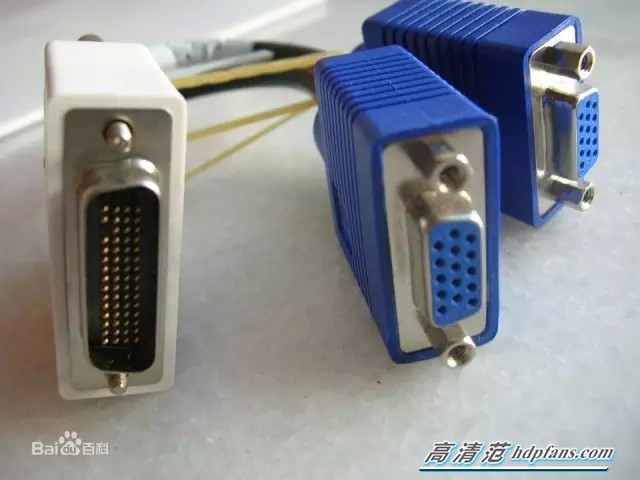
LeTV's TV will also exclude VGA, which means that many computers that only support VGA interface will not be able to use a 70-inch TV display.
Let's think this is understandable, after all, this TV is priced at 12,999 yuan, does not want to let ordinary consumers use. Millet TV is exactly the opposite of this idea. Let’s say that the Internet has died from concentration, and Xiaomi believes in the ultimate and focus.
Since the birth of Xiaomi TV, there has been only one idea: Let the average person consume the most advanced products. We have been working hard for it. Contrary to the LeTV approach, we do not try to change user habits, but let users use smart products more naturally and conveniently.
Millet TV 70 inches less than LeTV 3,000 yuan, but a true TV, the original imported Sharp 10th generation line panel, true 4K decoding technology, independent research and development of audio systems, never cut corners, connected to any set-top box can watch TV, Without access to the set-top box, the wired interface on the wall of your home can also look at analog TVs, and even tap the antenna to see terrestrial digital TV.
In this era when everyone is a geek, please concentrate on the product itself just like Xiaomi.